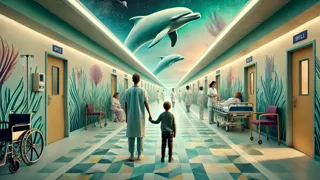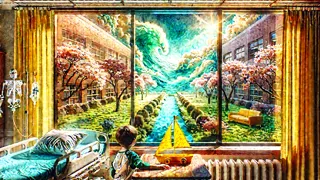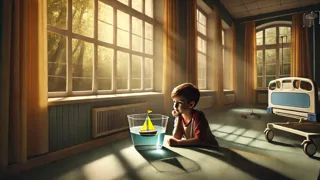Introduction
Ethan Carter was eight when the hospital became his second home. In a sunlit corner of a small coastal town in Maine, where gulls called and waves whispered against rocky shores, he first clutched the bright yellow plastic sailboat that would alter the days ahead. Diagnosed with acute lymphoblastic leukemia just weeks after summer vacation began, Ethan found feverish nights replaced salty sea breezes, and sturdy pine trees swapped for sterile white walls. His parents watched helplessly as their fearless boy grew pale, his laughter subdued by the hum of hospital machines. Treatments blurred the seasons and the ocean’s ebb and flow became a distant memory beyond sanitized corridors. Yet within Ethan’s imagination, the little yellow vessel transformed into a beacon of hope. Each evening, as nurses adjusted IV lines and dimmed the fluorescent lights to a gentle dusk, he held the toy boat aloft and conjured wind in its sail, guiding it across jeweled seas and past towering waves. His brother Max’s voice echoed as a fellow adventurer at the helm while his mother’s soft lullabies became the sea’s song. Even the hospital art therapist, with paintbrush in hand, helped him craft coral reefs and kelp forests on canvas, weaving these scenes into his nightly voyages. In that private world, the boy wasn’t a patient tethered to an oxygen monitor—he was a young captain charting uncharted waters, determined to return home to the shore he loved. Bit by bit, courage replaced fear, resilience took root in his heart, and Ethan learned that hope could sail beyond illness, carrying him toward new dawns and brighter horizons. He traced tiny scratches on the hull where years of play had left faint scars, imagining each as proof of battles fought and victories yet to come. In those moments, the yellow boat wasn’t just a toy—it was proof that even in the darkest depths of illness, a single spark of imagination could carry him toward light.
First Waves of Adversity
The morning of April 5th arrived with a brittle chill, the kind of early spring dawn that lingered halfheartedly between winter and warmth. Ethan Carter pressed his forehead against the cool pane of his bedroom window, watching his mother pack a bag with clothes and toys. Days before, he’d built sandcastles on Old Harbor Beach, his laughter dancing with the call of seagulls, but on that gray dawn, the hush of hospital hallways awaited him. The drive to St. Maris Children’s Hospital was silent; his father’s knuckles whitened on the steering wheel as he navigated deserted streets, and Ethan stared at the familiar houses passing by—none of them felt like home. When they arrived, a nurse with gentle eyes greeted them at the sliding doors. Under bright fluorescent lights, doctors in crisp white coats spoke in measured tones, words like “biopsy” and “chemotherapy” tumbling around him like puzzle pieces that refused to fit. Time fractured: one moment he was listening to his doctor explain “leukemia” and urgency; the next, he was under a cold ceiling, a needle pricking his vein, and the blur of his mother’s whispered “I love you” echoing in his chest. The sterile scent of antiseptic, the low hum of monitors, and the distant sobs of another child in pain etched themselves into his memory. Ethan realized then that his life had shifted to a new course, one charted by hospital rules and treatment plans. Fear wrapped around him like a thick fog, and he wondered how he would ever reclaim the warmth of sunlit shores. He carried Bluebear, his raggedy stuffed bear, unsure if he could part with its familiar softness. As they guided him through the labyrinth of sterile corridors, the patterned tile underfoot seemed endless, each step echoing in the hushed space. The walls were lined with pastel murals of smiling dolphins and cartoon astronauts, but those painted scenes felt distant from his own reality. The doctor’s face, gentle but worn, held the weight of difficult decisions, and Ethan’s mind spun with questions: Would the treatments work? Would he ever feel the spray of ocean mist again on his skin? In the admissions room, he watched nurses clip the smiley-face sticker to his chart, a small ritual meant to comfort him, while his mother’s trembling hands rearranged photos of their old summer vacations on the bedside table. And yet, as he exited the admissions office, his mother placed a single star-shaped sticker on his arm, a small emblem that felt like a silent promise: he was not alone, and this battle could be won.

As the first chemotherapy drip began to flow through the transparent IV line, Ethan lay cradled against his mother’s shoulder. The medication entered his body with an icy burn that sent shivers down his spine. Nurses timed each pulse, logging his vital signs in a ledger that felt more alive than he was at that moment. Days blended into one another: appetite vanished, leaving only the hollow ache of loneliness; hair drifted away in tufts, pooling on crisp white sheets; and the hospital pajamas, too large and scratchy, became his second skin. The cafeteria’s bland meals—gelatin in pastel hues and thin broth—offered no solace, and the artificial glow of vending machines flickering in the hallway became his only beacon during late-night migraine fits. Yet through the doorways of shared rooms, he heard whispers of resilience from other children: the clack of chess pieces in the playroom, the soft strum of a guitar from a volunteer musician, and the tentative giggle that erupted when someone offered to draw a funny face on his bald head. His brother Max visited whenever possible, reading comics aloud and leaving behind a half-eaten cookie that reminded Ethan of home. During art therapy sessions, he sketched images of tropical islands and friendly whales, though his hands trembled when the chemo fog clouded his thoughts. At times, anger swelled within him—anger at illness, at loss of normal life, at the ache in his parents’ eyes—but beneath it all, a stubborn ember of determination burned bright. During slow afternoons when the ward was silent, Ethan pressed his ear to the IV pump, joking that the constant beeping was a tune only survivors could dance to.
Two weeks into treatment, a battered cardboard box arrived from his grandmother in Maine. Inside, cushioned by a blanket of tissue paper, was a small yellow boat carved from pine wood, its hull sanded smooth and the words 'Courage' etched delicately beneath the bow. The grain of the wood and its sunny paint reminded Ethan of the golden driftwood he once found on the beach, glinting under the afternoon sun. That evening, as his chemo bag emptied and the beeping slowed to a steady lull, he traced the gentle curves of the toy’s sail, feeling the warmth of familiarity seep into his chilled fingertips. In that instant, his sterile hospital room blurred and transformed into a vast ocean; the bed rails became the drawbridge of a grand vessel, and the plastic IV stand served as the mast of his ship. Mind alight with possibility, Ethan imagined himself steering through turbulent waves, each spray of water a victory against pain. He shared the vision with Max over the phone, describing how the boat cut through tumbling swells, resisting the dark clouds overhead. His mother caught a glimpse of the magic in his eyes and set aside her fears to become his chief storyteller, weaving tales of coastal storms and calm harbors. Even the hospital’s janitor paused to admire the little boat and offered words of encouragement, recounting his own battles against adversity. Slowly, as rounds of treatment continued, Ethan’s spirit settled on the rhythm of imaginative voyages. Though his body bore the scars of chemotherapy, his mind flew freely across imagined seas, buoyed by the promise that each journey, like each phase of treatment, brought him closer to calmer waters. Each night, before sleep, he whispered his destination aloud—an isle of sparkling quartz whose shores would welcome him home.
Charting Imaginary Seas
Every afternoon, shortly after the chemo machines hummed to a temporary pause, Ethan positioned himself by the hospital corridor window, clutching his yellow boat like a precious compass. Beyond the glass, the courtyard stretched out in manicured lawns and blossoming dogwood trees, but to Ethan’s eyes, it transformed into a sweeping ocean. He rested the toy on the windowsill’s cool ledge and painted a vast seascape in his mind’s eye: an endless horizon rippling in turquoise and emerald, with clouds drifting like silent sentries overhead. As nurses walked by, he saw them as distant galleons braving open water, each providing supplies of strength and care. Visitors pushing carts became trade vessels, delivering essential gifts of medicine and encouragement. The humid spring air that wafted through cracked windows smelled of earth and renewal, further fueling his visions of islands teeming with tropical birds and inviting palm fronds. Though his body felt pinned to the bed, his spirit charted a course where waves rose and fell like gentle breaths, and each gust of wind carried the promise of a cure just beyond the next crest. He dotted his imaginary seas with floating lanterns, guiding lost captains back to safety, and he named each one for the nurses who had bandaged his scraped knuckles or offered a spare granola bar during a ravenous afternoon. In the quiet hush before dinner trays clattered down the hallway, he whispered coordinates to his loyal crew—an eclectic fleet of rubber ducks, miniature sailboats and hand-folded paper vessels scattered across the corridor floor—embarking on reconnaissance missions against fears that clung like seaweed to his thoughts. Even the flicker of the wall’s exit sign became a beacon, the distant lighthouse warning of hidden shoals. Through narrow monitors and thick glass, Ethan learned that some of the most profound adventures unfold not on storm-tossed waves but within the heart, where imagination charts a course toward uncharted possibilities.

As days turned into weeks, the journeys grew bolder. In one grand expedition, Ethan and his yellow boat found themselves caught in a tempest beneath a sky stained indigo. Rolling thunder echoed like ancient drums, and towering walls of water threatened to engulf their vessel. With trembling hands he steered into the heart of the storm, gripping the painted mast as wind tore at the plastic flags hoisted above his ship. He felt the same ache in his bones that chemo inflicted, a dull, persistent throb that seemed to match the roar of thunder outside his window. Yet, in that moment of trial, he summoned every ounce of strength cultivated during difficult treatments. Memories of supportive hands, of his mother’s lullabies and his brother’s triumphant cheers, surged within him like a hidden current, propelling the boat forward. Just when the gale appeared unstoppable, the clouds shifted, and a shaft of sunlight pierced the sky. Rainbows arched over churning waters, illuminating his yellow boat as it rose on a crest, triumphant. In Ethan’s mind, that victory was his own: a testament that even the fiercest battles could yield to hope’s unrelenting power. He paused to sketch the scene on a scrap of paper crumpled from the hospital bin—a dark sky split open by a sword of light and a steadfast vessel riding its waves. That drawing would later hang on his room’s wall as a silent reminder that courage could transform adversity into a story of triumph.
Word of Ethan’s imaginative voyages spread quickly through the ward. One evening, a volunteer named Rosa brought a model-making kit brimming with paint tubes, brushes and miniature masts. Together, they painted scores of tiny boats—yellow, azure, crimson—each bearing the names of children in remission or still in treatment. They launched these handcrafted vessels in a shallow trough of water beneath the playroom window, watching them dart and spin under gentle currents. Though the boats were fragile as wishes, they symbolized living proof that connection and creativity could flourish even inside a hospital’s sterile walls. With every new boat set free, Ethan felt the tremors of fear subside, replaced by a steady hum of anticipation for what lay ahead. His latest round of blood tests returned with dramatic improvement, and for the first time, his doctor described him as 'responding exceptionally well.' Physically, he regained strength—his cheeks flushed with color, his appetite returning like the tide reclaiming the sand. Emotionally, he carried a buoyant optimism, as though every brushstroke and every imagined voyage had woven a protective sail around his soul. Through storms and calm seas alike, the yellow boat had shown him the true power of belief, and Ethan knew that this journey—one of resilience, community and wonder—was far from over. In the quiet hours before lights-out, he would trace his finger along the curved hull, feeling not plastic or wood but the rhythmic pulse of hope itself. The ward’s art display soon featured a mural depicting his imagined seas: swirling cobalt waves and a triumphant yellow boat cutting through foamy crests, alive with energy. Visitors would pause in the hallway to admire it, offering words of praise that warmed Ethan’s heart brighter than any sunlight. He realized that the story he told with paint and precious plastic toys had reached beyond the confines of his room, inspiring nurses, parents and fellow patients alike. In their smiles, he discovered a deeper truth: that hope is not a solitary flame but a shared fire, kindled by the simplest act of storytelling and stoked by the collective will to believe.
Harbor of Hope and Healing
Months passed in a blur of treatments and imaginative voyages until the day Dr. Lin walked in with a wide smile and held out his medical chart like a cherished prize. The word 'Remission' shimmered on the page as though emblazoned in gold. Ethan felt tears sting his eyes—tears of fatigue, relief and a stunning wave of triumph. In that moment, the yellow boat etched in his memory transformed from a symbol of survival into a banner of victory. His room erupted with applause as nurses, doctors and fellow patients gathered around, each person mirroring his joy. Balloons in soft yellows and blues floated overhead, and the ward’s walls reverberated with laughter. Even the flowers on the windowsill bowed gracefully toward his bed, carried there by well-wishers who had tracked his journey from the very beginning. As he held the wooden boat in his palms, noticing the tiny cracks revealed by months of play, Ethan understood that every trial he had weathered—from the earliest needle prick to the fiercest chemotherapy storm—had guided him here. The experience had carved him like the hull of a vessel shaped by relentless waves, stronger and more resilient than he ever imagined possible. His parents embraced him fiercely, their held-back tears finally breaking free in joyful streams. His father’s voice cracked with emotion as he whispered, 'You did it, champ,' while his mother smoothed his forehead, marveling at the color returning to his skin. Max tossed confetti—bright yellow circles that danced in the air like sunspots—and teased Ethan about who would chart their next grand expedition. The playroom’s mural of Ethan’s seas and yellow boat looked down upon them, a silent witness to his transformative journey. The volunteers served homemade cookies, each sugar-coated bite tasting sweeter than any he’d known in remission. And when evening fell, the hospital gardens glowed with lanterns, guiding him to a celebration dinner under a canopy of twinkling lights, where hopeful notes of a string quartet drifted through the air. Every laugh, every hand squeeze, every shared glance built a living monument to perseverance, illuminated by the simple truth that a small toy could steer the tides of countless hearts. In that radiant evening glow, Ethan pressed the boat to his lips in a tender kiss, thanking it for braving every storm with him. He vowed to carry its spirit wherever he would go, knowing that healing was not merely the absence of disease, but the presence of unwavering hope.

When the suitcase zipped shut for the final time, Ethan stepped outside onto pavement that felt alive beneath his feet—no longer a sterile floor but the solid ground of homecoming. The salty tang of the Atlantic breeze greeted him as he walked down the hospital steps, and the sky stretched wide in a blush of late afternoon pink. Grandfather’s pickup truck was waiting in the parking lot, loaded with beach chairs, foam cooler and an eager golden retriever wagging its tail at the open gate. His mother placed the yellow boat carefully on the dashboard, as if it were a navigational instrument guiding them back to familiar shores. They drove along winding coastal roads lined with sea oats and weathered lighthouses, windows rolled down to let in the hymns of gulls and the distant rumble of surf. Ethan breathed deeply, filling his lungs with freedom, and felt the knots of hospital stress unravel with every mile. He squealed when Max pointed out the old wooden pier jutting into the bay, its planks worn smooth by years of footprints. 'First one to the end gets to steer my boat,' Max challenged, and Ethan laughed, feeling a buoyant lightness in his chest. They raced across the sand, leaving footprints that the tide would soon reclaim. At the pier’s edge, Ethan placed the yellow boat in a shallow tide pool etched among the pilings. The toy bobbed gently in brackish water under afternoon sun, like a triumphant envoy returning home. Nearby, seagulls wheeled overhead, their calls echoing his own laughter. He dipped his fingers into the tide pool, letting its cool water wash over his scars and memories. As twilight settled, they lit a small bonfire on the beach. His grandmother sat wrapped in a blanket, her fingers busy knitting a yellow scarf that matched the boat. Stories flowed between bites of marshmallows: tales of childhood mischief, of storms weathered and calm nights spent stargazing. Ethan recounted his imaginary voyages, and his words painted vivid skies that danced above their heads. The community, neighbors and old friends alike, gathered to celebrate his return, each bringing a gift—a seashell hand-painted with wishes, a board game for future sleepovers, a jar of honey from bee hives near the dunes. In the glow of those flames, between the salt of the ocean and the warmth of family, Ethan understood the true meaning of home: a harbor to rest his spirit, recharge his strength and prepare for voyages yet to come.
Ethan woke before dawn, drawn to the horizon where the sky blushed with the promise of a new day. The yellow boat rested on the windowsill of his childhood bedroom, silhouetted against the dawn’s glow. With practiced hands, he lifted it and ran his fingertip along the carved word 'Courage,' now slightly faded but still bold. He thought of the countless children he’d met whose stares fell between pity and hope, of the nurses who had held tears back to comfort him, of the volunteers who painted worlds in which he could sail free. Today, he decided, he would pass the boat along. Not because he no longer needed it—its magic would always be a part of him—but because its true power lay in gifting others the courage to dream. He penned a letter to the hospital, describing the boat’s journeys, its victories, its brushes with fear. He invited the next child admitted to become its new captain. In doing so, he entrusted his own bravery to someone else’s care, knowing that the act of giving was itself a voyage of the heart. After sealing the envelope with a sticker of a tiny anchor, he took the boat to the front desk of St. Maris Children’s Hospital. Nurse Rosa, her eyes misty with pride, accepted it and promised to deliver it to the child who needed it most. Walking away, Ethan felt a profound lightness, as though his spirit floated above the morning’s golden haze. He looked back once: the boat’s bright hull gleamed like a guiding star against the glass doors, ready to embark on its next adventure. And as he stepped into a world brimming with possibility, he carried with him the lasting truth that imagination, compassion and shared hope could chart a course toward healing for all who dared to believe.
Conclusion
Years have passed since Ethan Carter first held the wooden yellow boat beneath the stark lights of St. Maris Children’s Hospital, but its impact remains as vivid as ever. Today, he visits that same oncology ward—not as a patient, but as a mentor and friend—to share his story and remind young children that illness cannot tether the imagination. On a crisp spring morning, he led a group of former patients and volunteers in a boat-painting workshop on the hospital grounds. Laughter rang out as little hands decorated tiny vessels with hopes and dreams: medals for bravery, names of loved ones, and painted suns that beamed with unwavering faith. When it was time, each child set their creation afloat in a gently flowing canal built for the occasion. Ethan watched those painted boats drift, carried by subtle currents toward a shimmering fountain at the center—a symbol that life, like water, is always moving toward renewal.
In the months that followed, he championed a program to provide every incoming pediatric patient with a yellow toy boat engraved with a personal message of encouragement. Partnering with local artisans, he helped raise funds and awareness, shaping a legacy that extends beyond his own battle with leukemia. The original yellow boat still sits proudly on his windowsill, its faded paint and tiny scars serving as reminders of storms weathered and victories won. But it is the new fleet carrying bright visions of hope that truly defines his journey now—a journey where resilience, compassion and shared creativity chart a course toward healing for generations to come.


















